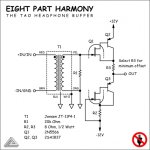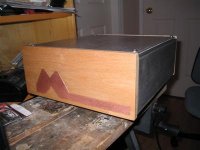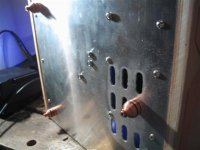Rudi,
I guess many of us have pretty decent systems... and surely me for one. About cables, currently I use only some VERY expensive top-of-the-line hi-end cables and/or DIY cables of my own design which have been compared favorably with some very expensive hi-end ones on several different systems. For power cords, I use various types of "Cablerie Deupen" cables only. And of course also all of the other components and accessories on my system are at the same level. No **** here.
About cables, currently I use only some VERY expensive top-of-the-line hi-end cables and/or DIY cables of my own design which have been compared favorably with some very expensive hi-end ones on several different systems. For power cords, I use various types of "Cablerie Deupen" cables only. And of course also all of the other components and accessories on my system are at the same level. No **** here. 
About speaker cables: they can make A LOT of a difference, believe me! In the past, when I changed from a CAT5-based DIY cable to a pair of Van den Hul "Magnum Hybrid", the improvement have been as HUGE as it have been replacing my previous commercial tube pre+amplifier pair (listing at "only" ~2200$ in '98 they were relatively "cheap" ones...) with my self-designed (and of course self-built) modified-Williamson triode amplifier! Later on I replaced the VdH with the Straightwire Crescendo's and again there have been a big improvement.
Later on I replaced the VdH with the Straightwire Crescendo's and again there have been a big improvement.
If you say that RG58 and CAT 5 are good enough... you still have a looong way to go!
you still have a looong way to go! 
BTW: STOP! we have gone completely OT... let go back to the point.
In a really good and well tuned system, any small detail does matter, and eventually become paramount. It's the sum of all those "little", "minor" details that builds up the difference between a great sounding, well tuned system and an average to poor sounding random assembly of audio gears.
The contact of a relay, no matter how good (or any kind of switch for that matter), is not just a small amount of resistance added to the circuit. It is a fundamentally non-linear one!
Any kind of contact is a very weird thing to have in any audio circuit and should be avoided as much as possible. And that's specially true in a high current circuit such as the amplifier-speaker one!!!
Not by chance most of todays hi-end gears have dropped tape loops, balance and any other superfluous switch or control, and I guess no one use any kind of switch on the loudspeaker interface anymore (...it used to be common practice e.g. on consumer HiFi gears from the '70s).
Now, it seems that "MyRef" sounds wonderfully in spite of the relay... maybe because the current feedback on the output current pump is able to reduce its influence.
Yet I would feel much more confortable if that contact would be avoided.
I bet that there will be some improvement. Very possibly a small one, or Mauro would have fixed that ages ago, but...
I guess many of us have pretty decent systems... and surely me for one.
 About cables, currently I use only some VERY expensive top-of-the-line hi-end cables and/or DIY cables of my own design which have been compared favorably with some very expensive hi-end ones on several different systems. For power cords, I use various types of "Cablerie Deupen" cables only. And of course also all of the other components and accessories on my system are at the same level. No **** here.
About cables, currently I use only some VERY expensive top-of-the-line hi-end cables and/or DIY cables of my own design which have been compared favorably with some very expensive hi-end ones on several different systems. For power cords, I use various types of "Cablerie Deupen" cables only. And of course also all of the other components and accessories on my system are at the same level. No **** here. About speaker cables: they can make A LOT of a difference, believe me! In the past, when I changed from a CAT5-based DIY cable to a pair of Van den Hul "Magnum Hybrid", the improvement have been as HUGE as it have been replacing my previous commercial tube pre+amplifier pair (listing at "only" ~2200$ in '98 they were relatively "cheap" ones...) with my self-designed (and of course self-built) modified-Williamson triode amplifier!
 Later on I replaced the VdH with the Straightwire Crescendo's and again there have been a big improvement.
Later on I replaced the VdH with the Straightwire Crescendo's and again there have been a big improvement.If you say that RG58 and CAT 5 are good enough...
 you still have a looong way to go!
you still have a looong way to go! BTW: STOP! we have gone completely OT... let go back to the point.
In a really good and well tuned system, any small detail does matter, and eventually become paramount. It's the sum of all those "little", "minor" details that builds up the difference between a great sounding, well tuned system and an average to poor sounding random assembly of audio gears.
The contact of a relay, no matter how good (or any kind of switch for that matter), is not just a small amount of resistance added to the circuit. It is a fundamentally non-linear one!
Any kind of contact is a very weird thing to have in any audio circuit and should be avoided as much as possible. And that's specially true in a high current circuit such as the amplifier-speaker one!!!
Not by chance most of todays hi-end gears have dropped tape loops, balance and any other superfluous switch or control, and I guess no one use any kind of switch on the loudspeaker interface anymore (...it used to be common practice e.g. on consumer HiFi gears from the '70s).
Now, it seems that "MyRef" sounds wonderfully in spite of the relay... maybe because the current feedback on the output current pump is able to reduce its influence.
Yet I would feel much more confortable if that contact would be avoided.
I bet that there will be some improvement. Very possibly a small one, or Mauro would have fixed that ages ago, but...
UnixMan said:Rudi,
If you say that RG58 and CAT 5 are good enough...you still have a looong way to go!

hi Paulo
if you interpreted this correctly then you would notice that i have given advice to the person that does not have anything fancy and it is a good starting point it is to easey to buy junk. i know that speaker cables can make a difference BUT you have to match it to your system if not they are as useless as lampcord.
i myself use audioquest for my digital, interconnect and speaker. for power cable i use a cable made up by Dr. H and we tested this against several name brands, it works as good and in some cases better.
as far as the relay goes. well disconnect it if it bugs you, or put some sencing circuit with opto couplers on the speakers terminating the inut or what ever you want to do with it. there is certainly a why to isolate it
Rudi
Relay
I do not like the relay either. At a minimum it would be a dual relay like the stereo version of Mauro, just paralleled to halve the contact resistance.
If you look at Mauros picture at the beginning of this thread, I lucked into that exact relay locally. I have not found as nice a single version yet.
But the unit works great as it is. So I guess the average quality ones will suffice for now.
Also, got to looking at the new mono boards. The 0.47 ohm resistor on he output has to be stood on end. Any chance of a later, larger version board that might fit a dual relay per channel and bring that large resistor down against the circuit board?
I only ask because I am a PITA. And can never leave things alone for any length of time.
George
I do not like the relay either. At a minimum it would be a dual relay like the stereo version of Mauro, just paralleled to halve the contact resistance.
If you look at Mauros picture at the beginning of this thread, I lucked into that exact relay locally. I have not found as nice a single version yet.
But the unit works great as it is. So I guess the average quality ones will suffice for now.
Also, got to looking at the new mono boards. The 0.47 ohm resistor on he output has to be stood on end. Any chance of a later, larger version board that might fit a dual relay per channel and bring that large resistor down against the circuit board?
I only ask because I am a PITA. And can never leave things alone for any length of time.
George
Turn off pop
Both my A and C version have a turn off pop when powering down. The pop intensity seems to be temperature related.
If run for many hours it is much louder. It seems to be minimized if the amp is muted for a minute, then turned off. I assume it is either the relay closing too slow, or a dc on the output being broken with the opening of the relay.
Cold, the amps measure a couple mv dc, the A more. The pop was about the same on each.
My speakers are more sensitive than most, this pop is 80 - 90 dB, it would be a lot lower in most systems.
Do others give a transient on power down?
George
Both my A and C version have a turn off pop when powering down. The pop intensity seems to be temperature related.
If run for many hours it is much louder. It seems to be minimized if the amp is muted for a minute, then turned off. I assume it is either the relay closing too slow, or a dc on the output being broken with the opening of the relay.
Cold, the amps measure a couple mv dc, the A more. The pop was about the same on each.
My speakers are more sensitive than most, this pop is 80 - 90 dB, it would be a lot lower in most systems.
Do others give a transient on power down?
George
The choice fo the output resistor was to preserve PCB space, but you will find that a lot of good Low L type resistors come in that size.
Same is true for the relay, we use good silver contact relays with very good characteristics. It is virtually the same as on Mauro's REV A PCB as only one relay is used there for both channels.
I have some very good gold and silver contact relays that are more than adequate.
Same is true for the relay, we use good silver contact relays with very good characteristics. It is virtually the same as on Mauro's REV A PCB as only one relay is used there for both channels.
I have some very good gold and silver contact relays that are more than adequate.
I see
Never thought of that. Thanks!
George
BrianDonegan said:The resistor "stood on end" is actually a vertical-mount resistor (radial).
Never thought of that. Thanks!
George
Try this
This is a discrete dc coupled, single ended circuit. Use 50 ohm resistors and your favorite +/- 12 -18 volt supply.
To get around unbalance replace R3 with a 40 ohm resistor and 10 ohm pot. Take the output off the wiper.
The parts are available from several suppliers.
George
This is a discrete dc coupled, single ended circuit. Use 50 ohm resistors and your favorite +/- 12 -18 volt supply.
To get around unbalance replace R3 with a 40 ohm resistor and 10 ohm pot. Take the output off the wiper.
The parts are available from several suppliers.
George
Attachments
- Home
- Amplifiers
- Chip Amps
- My "audiophile" LM3886 approach


